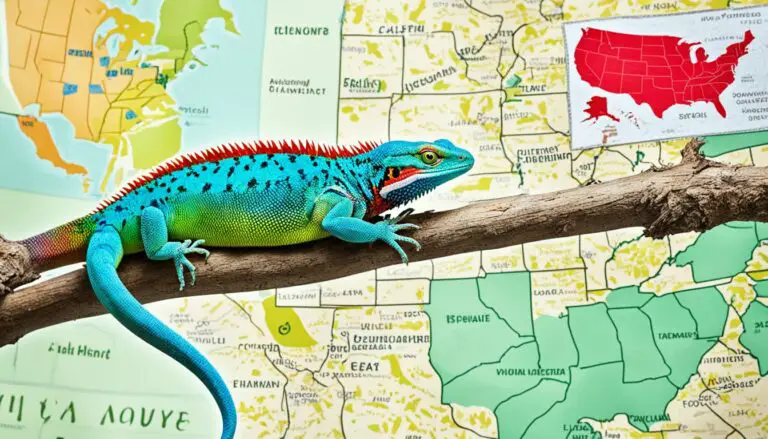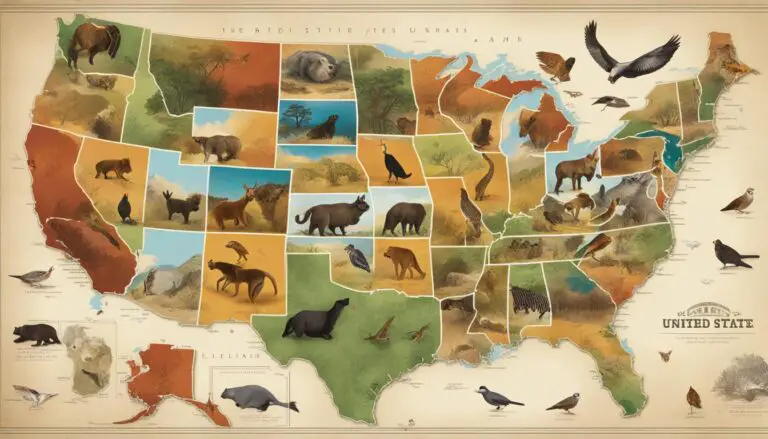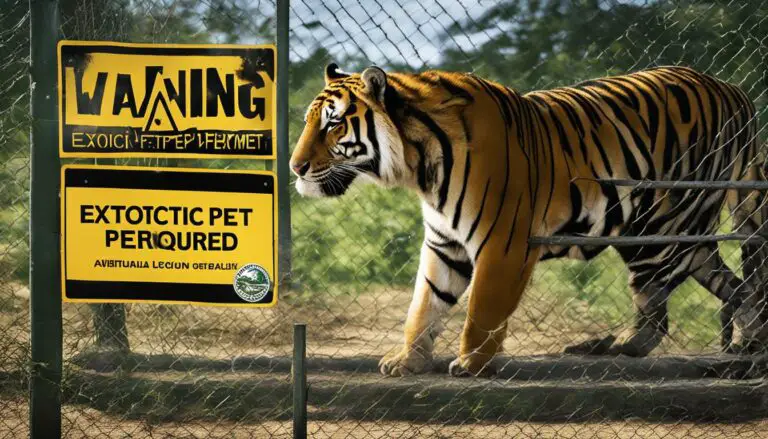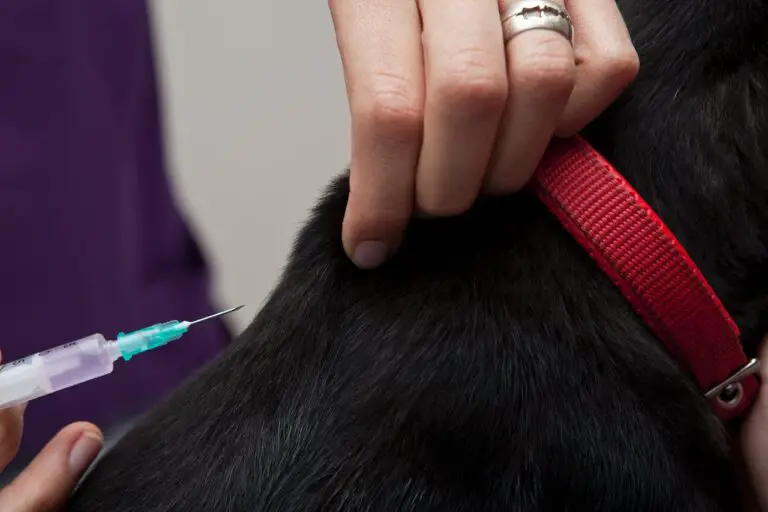Exotic Pet Health Certificate Laws in the US
When traveling with your exotic pet, it is important to be aware of the health certificate laws and regulations in the US. These laws vary from state to state and may require you to obtain a health certificate for your exotic pet. It is essential to plan ahead and ensure compliance with these laws to avoid any legal issues or complications during travel. The following section will provide information on the requirements and regulations for obtaining health certificates for exotic pets.
Key Takeaways:
- Exotic pet health certificate laws vary from state to state in the US.
- Complying with these laws is essential to avoid legal issues during travel.
- Plan ahead and obtain the necessary health certificate for your exotic pet.
- Consult with accredited veterinarians for guidance on the specific requirements.
- International travel with exotic pets requires compliance with both export and import regulations.
Understanding Exotic Pet Health Certificate Laws
Exotic pet health certificate laws play a crucial role in regulating the documentation and certification required for the transport and ownership of exotic animals. These laws have been established to ensure the health and welfare of these unique pets, prevent the spread of diseases, and safeguard public safety. However, it’s important to note that these laws may vary from state to state and cover different species of exotic pets.
When it comes to obtaining health certificates for exotic pets, there are several requirements that owners need to fulfill. These requirements can include veterinary examinations, testing for specific diseases, and the issuance of official certificates by accredited veterinarians. By complying with these regulations and having the necessary documentation in order, exotic pet owners can avoid potential legal consequences and ensure the well-being of their animals.
Furthermore, staying informed about the exotic pet health certificate regulations in your specific state is essential. This way, you can ensure that you are meeting all the necessary requirements and staying in compliance with the law. It’s also crucial to note that these regulations are subject to change, so it’s always a good idea to keep up-to-date with any updates or amendments.
“Exotic pet health certificate laws are in place to protect both the animals and the public. By complying with these regulations, owners can help maintain the well-being of their pets and contribute to public safety.”
Interstate Travel with Exotic Pets
Traveling with your exotic pet across state borders within the US requires compliance with interstate travel requirements for exotic pet health certificates. The specific regulations may vary depending on the states involved and the species of your exotic pet. To ensure compliance, it is essential to check the requirements of both your destination state and the state of origin.
In most cases, you will need to obtain a health certificate from a licensed veterinarian. This certificate confirms that your exotic pet is healthy and free from any communicable diseases. Failing to comply with these laws may result in confiscation of your pet or other legal consequences.
When planning interstate travel with your exotic pet, make sure to research and understand the following:
- The specific regulations of your destination state
- The specific regulations of the state of origin
- The type of health certificate required
- The documentation needed
It’s crucial to ensure that your exotic pet is in good health and meets the necessary requirements for travel. This helps protect the wellbeing of the animal and prevent the spread of diseases.
International Travel with Exotic Pets
When it comes to international travel with exotic pets, it is crucial to understand and comply with the health certificate policies and requirements. Each exporting and importing country has its own set of exotic pet health documentation laws that must be followed to ensure a smooth and legal journey for your beloved pet.
The regulations governing international travel with exotic pets can be more stringent compared to domestic travel. In addition to the basic health certificate, you may need to provide additional documentation such as import permits and specific health tests. Failure to comply with these laws can have serious consequences, including the denial of entry for your exotic pet.
To ensure a successful trip, contact the consulate or embassy of the destination country or the country’s animal health authority. They can provide you with the necessary information on the importation requirements, including any specific tests, vaccines, or paperwork required for your exotic pet. Additionally, it is recommended to consult the US Department of Agriculture (USDA) for guidance on animal and animal product export.
Compliance with international health certificate laws is essential to safeguard the well-being of your exotic pet and to prevent any legal issues during travel. By being well-prepared and knowledgeable about the requirements, you can ensure a safe and hassle-free journey for your furry or scaly friend.
| Country | Health Certificate Policies | Certificate Requirements for Exotic Pet Health | Exotic Pet Health Documentation Laws |
|---|---|---|---|
| United States | Proof of a health examination by a licensed veterinarian | Adequate vaccination records | Compliance with state-specific regulations |
| Canada | Proof of a health examination by a licensed veterinarian | Rabies vaccination certificate | Import permit |
| United Kingdom | Microchip identification | Rabies vaccination certificate | Import permit |
| Australia | Proof of a health examination by an approved veterinarian | Import permit | Quarantine requirements |
State Laws and Regulations on Exotic Pet Ownership
When it comes to owning exotic pets in the United States, it’s essential to understand the state laws and regulations that govern their ownership. Each state has its own unique set of laws regarding the possession and care of exotic animals, including specific requirements for obtaining and maintaining health certificates. These laws aim to protect both the welfare of the animals and the public’s safety.
Some states have implemented comprehensive bans on the private ownership of certain exotic species, while others have partial bans or licensure schemes in place. It is crucial for exotic pet owners to research and familiarize themselves with the laws of their respective states to ensure compliance and avoid any legal issues.
The Born Free USA organization provides a helpful summary of state laws relating to the private possession of exotic animals, serving as a valuable resource for exotic pet owners seeking information and guidance on the legal requirements.
Key Takeaways:
- Each state in the US has its own set of laws and regulations regarding the ownership of exotic pets.
- These laws may include specific requirements for obtaining and maintaining health certificates for exotic pets.
- Some states have comprehensive bans on the private ownership of certain species, while others have partial bans or licensure schemes.
- It is crucial for exotic pet owners to research and understand the laws of their state to ensure compliance and avoid legal issues.
- The Born Free USA organization offers a summary of state laws relating to the private possession of exotic animals for reference.
Summary of Exotic Pet Laws Across the US
A comprehensive overview of exotic pet laws across the US reveals the varying regulations governing the private ownership of wild or exotic animals. These laws aim to ensure the well-being of both the animals and the public, while maintaining the balance between conservation and responsible ownership.
| Ownership Restrictions | Number of States |
|---|---|
| Comprehensive Bans | 20 |
| Partial Bans | 13 |
| Permit or Licensure Schemes | 14 |
| No Specific Laws on Ownership | 3 |
Of the 20 states with comprehensive bans, individuals are prohibited from privately owning or possessing any wild or exotic animal species. These strict regulations prioritize the conservation of endangered species and protect public safety.
Thirteen states have partial bans, which means that specific species are prohibited or allowed under certain circumstances, such as acquiring permits or meeting specific criteria. These laws aim to strike a balance between responsible ownership and the preservation of public safety and well-being.
Fourteen states permit private ownership of exotic animals under licensure or permit schemes. These laws require individuals to obtain proper documentation and adhere to specific requirements outlined by state authorities. This approach allows for responsible ownership while ensuring that animals are well-cared for and pose no threat to public safety.
Three states do not have explicit laws governing private ownership of exotic pets. However, it is important to note that these states may have other regulations in place, such as import permits or health requirements, to safeguard public safety and animal welfare.
It is vital to remember that exotic pet laws are subject to change, and it is advisable to consult the relevant state authorities or legal experts for the most up-to-date information on exotic pet laws in your area.
Conclusion
In conclusion, complying with exotic pet health certificate laws in the United States is of utmost importance to ensure the well-being and legal status of your beloved exotic pets. Understanding the legal obligations and guidelines for obtaining health certificates is essential for a smooth travel experience, whether it’s interstate or international. By adhering to the regulations set by federal, state, and local authorities, exotic pet owners can travel with peace of mind and avoid any potential legal complications.
Remember that compliance with exotic pet health certificate laws may vary depending on the species of your exotic pet and the specific regulations of each state or country. It is highly advisable to consult with accredited veterinarians and relevant authorities to ensure you are meeting all the necessary requirements.
By staying informed and proactive, you can ensure the proper documentation and care for your exotic pets, protecting their health and maintaining your legal status as a responsible owner. The welfare of these unique creatures should always be a top priority, and by complying with exotic pet health certificate laws, you are contributing to their well-being and the preservation of this precious ecosystem.
FAQ
What are exotic pet health certificate laws?
Exotic pet health certificate laws regulate the documentation and certification required for the transport and ownership of exotic animals. These laws vary from state to state and aim to ensure the health and welfare of the animals, prevent the spread of diseases, and protect public safety.
What are the requirements for obtaining health certificates for exotic pets?
The requirements for obtaining health certificates can include veterinary examinations, testing for specific diseases, and the issuance of official certificates by accredited veterinarians. These requirements may vary depending on the species of the exotic pet and the specific regulations of each state or country.
Do I need a health certificate when traveling with my exotic pet within the US?
Yes, when traveling across state borders within the US, you must comply with the interstate travel requirements for exotic pet health certificates. These requirements may vary depending on the states involved and the species of your exotic pet. Failure to comply with these laws may result in confiscation of your pet or other legal consequences.
What are the regulations for international travel with exotic pets?
International travel with exotic pets requires compliance with the health certificate laws of both the exporting and importing countries. The regulations for international travel can be more stringent and may involve additional documentation, such as import permits and specific health tests. Consulting with the consulate or embassy of the destination country or the country’s animal health authority is crucial to obtain the necessary information on importation requirements.
What are the state laws and regulations on exotic pet ownership?
Each state in the US has its own set of laws and regulations regarding the ownership of exotic pets. These laws can include specific requirements for obtaining and maintaining health certificates for exotic pets. It is important for exotic pet owners to research and understand the laws of their state to ensure compliance and avoid any legal issues.
What is the summary of exotic pet laws across the US?
A comprehensive overview of exotic pet laws across the US reveals that 20 states have comprehensive bans on the private ownership of wild or exotic animals. Thirteen states have partial bans, while 14 states permit private ownership under licensure or permit schemes. The remaining three states do not have specific laws addressing the private ownership of exotic pets but may regulate some aspects, such as import permits or health requirements.
How can I ensure compliance with exotic pet health certificate laws?
To ensure compliance with exotic pet health certificate laws, it is essential to familiarize yourself with the regulations of your state or country, consult with accredited veterinarians, and contact relevant authorities for guidance. Adhering to these laws not only ensures the well-being of your exotic pet but also prevents any legal consequences.
Source Links
- https://www.avma.org/resources/pet-owners/petcare/cvi/traveling-exotics-such-rabbits-ferrets-small-rodents-and-others
- https://www.bornfreeusa.org/campaigns/animals-in-captivity/summary-state-laws-exotic-animals/
- https://www.animallaw.info/content/map-private-exotic-pet-ownership-laws
Peter Stones is the founder of Exotic Pets Place, the leading online resource for exotic pet care information.
With over 10 years of hands-on exotic pet ownership experience, he is deeply passionate about sharing his expertise to help others properly care for their unusual pets.
When he's not writing extensively researched articles or connecting with fellow exotic pet enthusiasts worldwide, you can find Peter at home tending to his own beloved menagerie of exotic animals.







